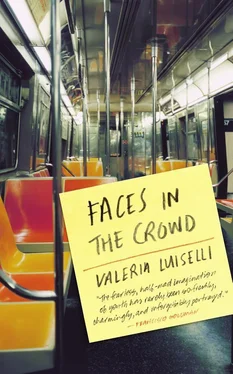*
I only leave my bed to make meals for the children, when their father isn’t here to do it. I look at my legs, they’re like two elephants’ trunks.
*
Hey, Mr. Collyer?
Yes, Owen.
Do you have a ghost?
Several.
Who are they, where do they live?
With the greatest respect, my dear Owen, what the hell does it matter to you?
*
I considered a speakeasy an appropriate venue for a date with Iselin. As most places of that ilk had permanently closed down in the Bowery, where she almost always suggested we go, I arranged to meet her at the entrance to the subway on 125th Street, near my house. I waited. She arrived late, dressed à la garçonne, her hair pulled up under a hat. Manhattan has to be seen from the subway, she said, giving me a tight hug, more fraternal than provocative. The people who see it from above, from the Woolworth Building, don’t see anything, they live in a mock-up of a city. Iselin was like a Paul Morand who always got away with that type of pretentious remark just because she didn’t really mean it.
We went to a dive on 132nd Street. They sold gin. We didn’t stay long because I was sure Nella Larsen would appear and I didn’t want to see her. But we drank quickly and well. After the fourth round, my companion gave her hat to a sax player, saying: You’re the cat’s pajamas, boy. At that time I didn’t understand the expression, but something in me did, and my blood boiled with jealousy. I drank too much, hit the sax player with his instrument, took back the hat, and died again. I don’t know of what, nor did I care: I woke up on the roof terrace of my building, Iselin’s boyish hat on my head, her head on my chest, my hand stroking her straight hair strewn across my shoulder. I believe I really loved her.
When she had woken up and we were walking across the roof to go down for breakfast, I noted that the orange tree and its horrible pot, which I had left there months before, had gone.
*
Then I go back to the novel. A vertical novel told horizontally. A story that has to be seen from below, like Manhattan from the subway.
*
Nella Larsen was a writer. She was also Danish and a mulatta. In that sense, she was a walking, wiggling paradox who united the two characteristics that separated the Owens from the Federicos of this world: the Swede and the African, the world of the whites and the world of the blacks, what was not mine and what was not his. That to which we both aspired in a culture incapable of absorbing us. Nella invited us to a party at her brownstone on the corner of Convent Avenue and 143rd Street. I’ve only invited blacks, but you, Federico (she pronounced the d in Federico as if she were holding a marble between her teeth), are sufficiently black, and you, Gilberto, you look like an Apache or a Suomi, and you have an uglier nose than the average mulatto. Do all Mexicans look that way? Besides, we need a translator for Federico. I smiled at her and said, Thanks, Nella, and then explained to Federico: Nella says that it’s going to be all blacks at her party and the only white person will be you.
Federico was mad about Nella’s small, perfectly square teeth, her little-boy’s pout, the upper lip slightly darker than the lower; as for me, I don’t know what I liked. I think, deep down, I didn’t like anything. In fact I disliked her. I didn’t want to go to the party, but Federico was in newcomer-to-the-city mode and insisted. I don’t know why I submitted to the torture of those Harlem tertulias: I trotted along to them with Federico like a chihuahua, and was never more than a remote presence who could neither sing nor dance, only translate and bark a little.
That night at Nella’s there was a lot of whisky. We sat around an oak coffee table. Federico was a long way off, on the other side of the room, and I had no one to talk to. I was served a drink that I sipped in silence until, through the arch separating the lounge from the dining room, came a man, thin, very young and very dark, simple in his mannered way. This is a surprise I’ve brought for you, my darlings, announced Nella, and everyone stopped talking. She turned to me with a half-moon smile: A little Mexican gem, Gilberto, that I’ve brought just for you.
The guests, uninterested, took up their conversations where they’d left off and the young man came to sit beside me, almost on my lap, and held out a soft hand: José Limón, painter and ballet dancer. Painter or ballet dancer? I asked, and immediately disliked myself. I’ve never been able to say the things I think in the tone I imagine before uttering them. I think it has to do with not having a good ear. That’s why I’ve always been a bad dancer and never learned to play an instrument. It happens with songs: I hear them perfectly in my head but then I can’t sing them. And eloquence of speech comes down to that very thing: being able to say things in the way one imagines them. Limón seemed to be a decent kid. More of a ballet dancer, he said, with a wide, explanatory smile.
José Limón was from Sinaloa, like me, and he’d also left as a young child. He had an affected way of telling his story; he was brimming with self-confidence, as if he knew in advance that his was a trajectory and not just a life; a train that left Sinaloa to arrive somewhere. There are people who are capable of recounting their lives as a sequence of events that lead to a destiny. If you give them a pen, they write you a horribly boring novel in which each line is there for an ultimate reason: everything links up, there are no loose ends. But if you stop them talking and set them to dance or paint, you end up forgiving the ugliness, the foolish expression, the unbridled arrogance of a child prodigy.
Federico began playing a typically Spanish melody on the piano. The guests livened up and took off their jackets. I shrank. Nella sang a little, bending the words of a blues number everyone clearly knew to make them fit into the open-mouthed glass offered by Federico, another super-talented, almost autistic prodigy, now determined to please a bunch of Yankees; blacks, sure, but Yankees all the same. I shrank even further: a chihuahua among mastiffs. The Limón kid sprang up, most probably emboldened by the drinks and the general euphoria, and landed by the piano. When Federico finished the last copla, he whispered something in his ear. The Spañolet smiled in answer and began to play a waltz.
Limón started dancing, or something like it, and Federico accompanied him on the piano. The guests drew back, forming a semicircle around them; they watched the two of them as you might a family of tropical crabs in a fish tank.
Limón’s body moved as if dominated by a horizontal vertigo. His pendulum arms swung with apparent independence around an invisible center of gravity at the level of his navel, legs closely following the gravitational pull of his arms. He anticipated the music only to fall back exactly on the beat. There was a certain sad virtuosity in that thin, compact, brown-skinned body negotiating falls and suspensions with life and death. Federico — it was obvious — was leaving his mouth and soul between Limón’s legs.
I was absorbed in the performance, deeply moved, when laughter began to break out among the guests. First timid vibrations of tongues, then teeth and spluttering lips, then explosions from bellies, pectorals, whole bodies languishing in the stridency of a guffaw prolonged beyond that house, beyond that street and that night.
The effects of laughter are devastating, capable of destroying anything that proclaims itself to be sincere, of flipping it over and showing its ridiculous side. I looked away, toward the window, the city and its lights, the darkness surrounding every globe of artificial light. Federico went on playing to the end and Limón continued dancing. When they finished, I applauded enthusiastically and the others started dancing, with Nella again at the piano. Limón disappeared, as do ghosts or the valiant; I stayed in my place on the floor, watching them all dance, clapping obediently at the end of each song, until dawn broke and Federico got me out of there.
Читать дальше











